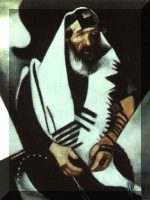 | Catalunya Israel
Fòrum d'agermanament entre Israel i els Països Catalans
|
|
| | Cognoms jueus |  |
| | | Autor | Missatge |
|---|
Sayeret
מנהל

Nombre de missatges : 895
Localisation : Baix Empordà
Registration date : 22/01/2007
 |  Assumpte: Cognoms jueus Assumpte: Cognoms jueus  Dc Ago 22, 2007 3:09 am Dc Ago 22, 2007 3:09 am | |
| Ten vostede sangue xudía? Os apelidos que poden consultarse nas seguintes ligazós foron publicados polo xornalista e escritor catalán Pere Bonnín no seu libro "Sangre judía. Españoles de ascendencia hebrea y antisemitismo cristiano" (Flor de Viento Ediciones. Barcelona, 1ª edición 1998). Estes apelidos están sacados das listas de penitenciados polo Santo Oficio, dos censos das xudarías e de outras fontes que indican claramente que a persoa portadora do apelido é xudía ou xudeuconversa. Por conseguinte, todos estes apelidos son suspeitos de ascendencia xudea, aida que os seus titulares non teñan conciencia diso. http://www.tarbutsefarad.com/media/archivos/A.pdf http://www.tarbutsefarad.com/media/archivos/B.pdf http://www.tarbutsefarad.com/media/archivos/C.pdf http://www.tarbutsefarad.com/media/archivos/D.pdf http://www.tarbutsefarad.com/media/archivos/E.pdf http://www.tarbutsefarad.com/media/archivos/F.pdf http://www.tarbutsefarad.com/media/archivos/G.pdf http://www.tarbutsefarad.com/media/archivos/H.pdf http://www.tarbutsefarad.com/media/archivos/I.pdf http://www.tarbutsefarad.com/media/archivos/J.pdf http://www.tarbutsefarad.com/media/archivos/K.pdf http://www.tarbutsefarad.com/media/archivos/L.pdf http://www.tarbutsefarad.com/media/archivos/M.pdf http://www.tarbutsefarad.com/media/archivos/N.pdf http://www.tarbutsefarad.com/media/archivos/O.pdf http://www.tarbutsefarad.com/media/archivos/P.pdf http://www.tarbutsefarad.com/media/archivos/Q.pdf http://www.tarbutsefarad.com/media/archivos/R.pdf http://www.tarbutsefarad.com/media/archivos/S.pdf http://www.tarbutsefarad.com/media/archivos/T.pdf http://www.tarbutsefarad.com/media/archivos/U.pdf http://www.tarbutsefarad.com/media/archivos/V.pdf http://www.tarbutsefarad.com/media/archivos/W.pdf http://www.tarbutsefarad.com/media/archivos/X.pdf http://www.tarbutsefarad.com/media/archivos/Y.pdf http://www.tarbutsefarad.com/media/archivos/Z.pdf Segons això el meu primer cognom és d'origen jueu  | |
|   | | Yitzhak

Nombre de missatges : 23
Registration date : 28/06/2007
 |  Assumpte: Re: Cognoms jueus Assumpte: Re: Cognoms jueus  Dc Ago 22, 2007 8:59 am Dc Ago 22, 2007 8:59 am | |
| Doncs a mi em coincideix el cognom matern. Encara millor!
En vaig coneixer a un a Jerusalem que es lamentava perque no el reconeixien com a jueu ja que nomes ho era el pare. | |
|   | | Odalric

Nombre de missatges : 155
Localisation : Catalunya
Registration date : 07/02/2007
 |  Assumpte: Re: Cognoms jueus Assumpte: Re: Cognoms jueus  Dc Ago 22, 2007 1:58 pm Dc Ago 22, 2007 1:58 pm | |
| A mi i a la meva dona ens coincideix el cognom matern  | |
|   | | espiadimonis

Nombre de missatges : 325
Registration date : 22/01/2007
 |  Assumpte: Re: Cognoms jueus Assumpte: Re: Cognoms jueus  Dc Ago 22, 2007 4:05 pm Dc Ago 22, 2007 4:05 pm | |
| | |
|   | | xaroussek

Nombre de missatges : 57
Registration date : 22/01/2007
 |  Assumpte: Re: Cognoms jueus Assumpte: Re: Cognoms jueus  Dv Ago 24, 2007 4:26 pm Dv Ago 24, 2007 4:26 pm | |
| Segons aquesta llista el meu segon cognom és ultra jueu xDDD | |
|   | | xaroussek

Nombre de missatges : 57
Registration date : 22/01/2007
 |  Assumpte: Re: Cognoms jueus Assumpte: Re: Cognoms jueus  Ds Ago 25, 2007 4:03 pm Ds Ago 25, 2007 4:03 pm | |
| Especifico: és ultra jueu perquè és un cognom compost a partir de dos cognomes, i ambdós cognoms apareixen a la llista. | |
|   | | Joel Català

Nombre de missatges : 299
Localisation : Catalunya
Registration date : 21/06/2007
 |  Assumpte: Re: Cognoms jueus Assumpte: Re: Cognoms jueus  Dl Set 03, 2007 7:25 pm Dl Set 03, 2007 7:25 pm | |
| "Klein" és un cognom originalment jueu, però avui dia hi ha més kleins cristians que no pas jueus.
La judeïtat no depèn del cognom, ni de la "sang", sinó de la Halachà --la Llei Jueva. | |
|   | | tlisboa

Nombre de missatges : 102
Age : 45
Localisation : Tarragona
Registration date : 09/02/2007
 |  Assumpte: Re: Cognoms jueus Assumpte: Re: Cognoms jueus  Dl Set 03, 2007 9:03 pm Dl Set 03, 2007 9:03 pm | |
| De acuerdo Joel.... La Halacha debe ser el punto fundamental y mas importante a ser considerado... pero aqui se trata de una situación muy particular... El hecho de que alguien reconozaca su apellido como judio y al buscar su historia descubra que tiene antepasados judios que de una manera voluntaria o, más probablemente, involuntaria acabaran convertidos al cristianismo no borra la identidad judia de esta persona... si ademas busca conocer su historia, busca su identidad historia con el pueblo judio no debemos utilizar la Halacha para discriminar o descalificar la identidad de esta gente... los anussim existen!!! Y estan principalmente aqui en España, en Portugal y en toda latino-america. Debemos aprovechar el interesse de esta gente que se reconoce en los apellidos judios y se depara con antepasados judios convertidos en su historia personal para enseñar a los que asi deseen más de la historia de su pueblo, del mundo judio y de la vida en comunidad, y integrarlos y no descalificar su posible identidad judia... y si quieren participar de la vida en comunidad para conocer la historia de su pueblo, excelente... y aquello que al conocerla decidan volver a su pueblo con la (re)conversión, pues sera una decision personal... pero creo que muchos "judios perdidos" por alli gustarian de saber más de su identidad judia y del mundo a que perteneceran sus antepasados. Perdoname los errores de un no-castellano hablante...
Shalom | |
|   | | Odalric

Nombre de missatges : 155
Localisation : Catalunya
Registration date : 07/02/2007
 |  Assumpte: Re: Cognoms jueus Assumpte: Re: Cognoms jueus  Dt Set 04, 2007 1:30 am Dt Set 04, 2007 1:30 am | |
| Un comentario muy bonito, Tlisboa... | |
|   | | tlisboa

Nombre de missatges : 102
Age : 45
Localisation : Tarragona
Registration date : 09/02/2007
 |  Assumpte: Re: Cognoms jueus Assumpte: Re: Cognoms jueus  Dt Set 04, 2007 2:26 pm Dt Set 04, 2007 2:26 pm | |
| gracias odalric...
Os dejo un texto retirado del excelente blog Herut: http://www.herutx.blogspot.com/
¿Cuál es el milagro de la supervivencia judía?
Rabí Israel Meir Lau, ex Gran Rabino de Israel.
Imagine la diferencia entre una visita realizada a su patria por Julius Cesar y una por Moisés.
Julius Cesar desembarca en el Aeroporto di Roma en Italia, e inmediatamente sentirá que algo está equivocado. La gente no habla su idioma. La religión local es completamente diferente. Y Roma ya no es más la capital cultural del mundo. Él no tiene nada en común con los habitantes de su tierra.
En el Aeropuerto internacional Ben Gurion en Tel Aviv, la escena se despliega de manera muy diferente. Un Moisés anciano sale del avión. La emoción lo supera cuando sus pies tocan la tierra de Israel por primera vez. Habiendo llevado su nación a través del desierto durante cuarenta años y falleciendo allí sin alcanzar la Tierra Prometida, Moisés finalmente lo ha logrado.
"Shalom" le dice un joven maletero del aeropuerto que emigró hace poco de Rusia y que se acerca para ofrecerle ayuda. "Shalom" contesta Moisés, asombrado del hecho que el idioma hablado en este lugar maravillosamente moderno es el mismo que él hablaba hace miles años.
Luego observa un grupo de hombres que reza en una esquina del aeropuerto. Cuando se les acerca, ve que cada uno de ellos viste Tefilín y Talit.
Después de que terminan de orar, Moisés habla con ellos y examina sus artículos religiosos. Son iguales a aquellos que él ordenó en el Monte Sinai.
Más de tres mil años separan a estos hombres. Uno nació en Egipto; los otros en Moscú, Etiopía, Nueva York, Casablanca, Bombay, Sydney, París, y johannesburgo. Todavía comparten el mismo idioma, fe, tradición, y visión de vida. Moisés dirige su cara al Cielo y grita:
"¡Bendito es el Omnipotente, pues mi pueblo todavía está vivo!"
La nación judía ha sobrevivido imperio tras imperio de supuestos perseguidores. Egipto antiguo, Persia, la antigua Grecia, Roma, ¿Ahora dónde están?
¿Cuál es el milagro de la supervivencia judía?
Es nuestra unificada fe judía, historia y herencia.
Hemos sobrevivido a lo largo de los siglos debido a la cadena indestructible de nuestra herencia.
El 15 de Nisan todos los judíos se sientan juntos a un Seder de Pesaj.
Comemos la misma comida, la misma Matzá. Algunos recitan la Hagadá entera, otros un resumen, y otros cantan unas canciones.
Tres mil trescientos años es un largo tiempo para guardar el mismo menú. | |
|   | | espiadimonis

Nombre de missatges : 325
Registration date : 22/01/2007
 |  Assumpte: Re: Cognoms jueus Assumpte: Re: Cognoms jueus  Dt Set 04, 2007 3:55 pm Dt Set 04, 2007 3:55 pm | |
| Aquesta és, precisament, la grandesa del poble jueu. La tossuda pervivència del seu passat. La diàspora i les persecucions que ha sofert han estat alhora una desgràcia i una "sort". Sense això, possiblement aquest gran poble jueu no hagués tancat files a l'entorn de l'única cosa que els podia unir en la llunyania: la religió. | |
|   | | Joel Català

Nombre de missatges : 299
Localisation : Catalunya
Registration date : 21/06/2007
 |  Assumpte: Re: Cognoms jueus Assumpte: Re: Cognoms jueus  Dv Set 07, 2007 9:03 pm Dv Set 07, 2007 9:03 pm | |
| Benvolgut tlisboa,
Només puntualitzar una cosa més: el que existeix són els descendents dels anussim (els forçats a convertir-se al cristianisme), no els mateixos anussim.
Per tant, tot "retorn" al judaïsme hauria de ser sobretot una decisió personal poc relacionada amb l'ascendència (els avantpassats).
Tenir ascendència anussim és un fet comú de molts catalans, però davant la seriositat que comporta la conversió, això no és més que una curiosat afegida. Penso jo. | |
|   | | tlisboa

Nombre de missatges : 102
Age : 45
Localisation : Tarragona
Registration date : 09/02/2007
 |  Assumpte: Re: Cognoms jueus Assumpte: Re: Cognoms jueus  Dv Set 07, 2007 11:32 pm Dv Set 07, 2007 11:32 pm | |
| Estimado Joel
De acuerdo... la conversión es una decision personal que no tiene que depender de la presencia de antepasados... pero creo que más que una curiosidad el echo de ser descendiente de los anussim puede ser si la motivacion personal para que se busque conocer y estudiar el judaismo (es mi caso particular incluso)... y partindo del conocimento y del estudio orientado en las comunidades decidir, de manera personal, por el retorno al pueblo de sus antepasados... Estoy totalmente de acuerdo de que la conversion es un punto muy serio y que no puede depender de la presencia de antepasados y si del estudio y conocimiento del judaismo.
Shabat Shalom | |
|   | | tlisboa

Nombre de missatges : 102
Age : 45
Localisation : Tarragona
Registration date : 09/02/2007
 |  Assumpte: Re: Cognoms jueus Assumpte: Re: Cognoms jueus  Dl Set 10, 2007 3:53 pm Dl Set 10, 2007 3:53 pm | |
| Como se ha tocado el tema de la conversion y de la seriedad que comporta este proceso de unirse al pueblo de Israel, posto un texto muy interesante acerca del tema... en ingles pero creo que la mayoria de los companeros no tendrá problemas...
Shalom!!!
The Meaning of Joining the Jewish People
By: Ophir Yarden
Much of my work enables me to meet, and to teach, Christians visiting Israel. Among the many memorable conversations I have had, one comes to mind as I contemplate this question.
While engaged in a round of introductions one young woman said more or less the following: “My name is C., I studied…in London…and I’ve been a Christian for five years.” Now that I think back on the episode I’m surprised I didn’t have to be picked up off the floor - so great was my astonishment. Why? It was plain to the eye that this Christian was not five years old - rather she was closer to twenty-five - yet it was somehow clear that neither was she a convert to Christianity. At a later point I probed, “Are your parents Christian?” “Well, sort of. Not really,” was the essence of the reply. She later clarified her terms and explained that, for her, she had been a Christian only from the time at which she accepted certain beliefs. Her birth to ‘nominally Christian’ parents, her baptism and even her own pro forma confirmation did not suffice to make her a Christian. (Note: Not all Christians would agree with her perspective. Like Jews, they have many differences of opinion.)
This did not accord with my Jewish-based concepts of (so-called religious) identity. It was plain to me that we, as Jews, were Jews from the moment we were born. (Naturally the case of converts is different. I’ll come to this important issue later.) It matters not a whit how we feel about it, how or how much we do or do not observe, the lifestyle or beliefs of our parents or, for that matter, even our own beliefs.
These Jewish notions are easy enough to understand when one views Judaism in terms that are broader than merely those of religion. Religion, including other religions and the religious aspects of Judaism, is concerned with beliefs and practices. But Judaism is more than just creed and deed. Judaism and Jewishness are also made up of ethnicity, history, culture, language and nationality (especially clear in modernity with the advent of the State of Israel). I am not comfortable thinking of Jews as co-religionists. I happen to be observant, but can someone non- [or even anti-] religious be my co-religionist? Yet I insist that we are part of the same people. People is the only term for the Jewish collective that provides an adequate, if loose, definition.
My primary connection to my Judaism is my connection to the Jewish People. To be blunt: If I have a ‘vertical’ connection to a transcendental God it comes after my ‘horizontal’ connection to the Jewish People. This is consistent with Jewish teachings that address the essence of Jewishness. Some of these teachings are explicitly connected to the festival of Shavuot.
The ‘conversion’ of Ruth the Moabite, as related in the scroll bearing her name, is read on Shavuot. Ruth’s joining the Jewish People is depicted as follows. After Ruth’s familial tie to the Israelites is severed by the death of her husband, her Judean mother-in-law Naomi expects her to return “to her people and her gods” (Ruth 1:15). Ruth adamantly insists that she will remain with Naomi saying: “Do not urge me to leave you, to turn back and not follow you. For wherever you go, I will go; wherever you lodge, I will lodge; your people shall be my people, and your God my God. Where you die, I will die, and there I will be buried. Thus and more may God do to me if anything but death parts me from you.” (Ruth 1:16-17)
Ruth thereby casts her lot with Naomi and her fellow tribespeople of Judah but there is no element of any religious conversion. No ceremony is mentioned nor is there any indication of Ruth’s ritual behavior. First (and foremost?) she adopts Naomi’s people and secondly she accepts Naomi’s God: “…your people shall be my people, and your God my God.”
Other than circumcision for males there was no ritual or religious ceremony of conversion in Biblical times; these are products of a later age - that of Rabbinic Judaism. Another Biblical episode may shed light on the matter of joining the Jewish (then Israelite) People in Biblical times. In the book of Ezra the story is told of the Jews who returned to Jerusalem from the Babylonian exile (after 536 BCE). They were approached by residents of the Land of Israel (their identity is not clear and remains the subject of scholarly debate) who had adopted the practices of the proto-Jews. These residents proposed the following: “Let us build [the Temple] with you, since we too worship your God.” (Ezra 4:2) But their attempt to join in the building of the Temple (and presumably the “Jewish People”) was rebuffed by the leadership of the time: “It is not for you and us to build a House to our God, but we alone will build it to the Eternal God of Israel.” (Ezra 4:3)
The Israeli Biblical scholar Yehezkel Kaufmann suggested that an element of misunderstanding might lie at the base of this interchange. Those who had adopted Israelite practice, belief and worship of the God of Israel believed that they had ‘converted.’ To the ears of the Jews this meant nothing. They were, Kaufmann suggests, unfamiliar with the concept of conversion. From their perspective the only route to joining their tribe was that of assimilation. Yes, they could assimilate into the Jewish People.
Even if Kaufmann’s thesis is incorrect (as many Biblical scholars will argue) he has presented us with some interesting ideas. He has drawn our attention to the tribal/ethnic nature of Jewish identity in the Biblical era and pointed out that the concept of ritual conversion would develop only at a later stage. But perhaps most interestingly he has presented a concept of assimilation into the Jewish (then Israelite) People. Today we are not accustomed to using this term in conjunction with movement towards Judaism; assimilation is seen as a threat to the Jewish People, not as a means of its enrichment. But Kaufmann, the secular Israeli, expresses elements of classical Zionist thinking as he envisages a ‘normal’ Israelite/Jewish People living as a majority on its own land. In his picture the Bible’s Jews are the dominant demographic group and their culture is not threatened by assimilation. The burden to maintain a unique identity is upon those who live amongst them as a minority. (One might wonder if there was a “Canaanite Continuity Commission” losing sleep over their diminishing demographics!) Joining the Jewish People was a slow evolutionary - not revolutionary - process.
In our experience, and that of our people for nearly 2,000 years, becoming a member of the Jewish People is an abrupt matter. Whether by birth or by conversion, becoming a Jew is a sharp break with one’s status quo ante. And it is not by coincidence that conversion experiences are described as re-birth. This is true for many Christians and many Jews, and it was true of Jewish Zionist pioneers who saw their becoming Israeli as re-birth and often expressed it as such when on their gravestones they indicated only two dates: their date of aliya (immigration to Israel) and their date of death. It was to that sense of re-birth that C. was referring when she introduced herself and told me that she’d been a Christian for five years.
Abrupt as the birth experience - epitomized by the severing of the umbilical cord - may be, we see the birth of a Jewish child as the most natural of developments. We circumcise (boys), confirm the covenant and give the child a name almost immediately after birth. It is plain to us that the child is a Jew. It only remains to be seen what kind of Jew this individual will become. Should s/he choose not to follow the commandments and customs of our people, most of us (and usually s/he as well) will continue to consider her/him to be a Jew. This is in accord with our tradition which states: “[Concerning] one of Israel who sinned, Rabbi Abba bar Zabda said: ‘Even though he has sinned, he remains one of Israel.’” (Babylonian Talmud, Tractate Sanhedrin 44a) A Jew who sins may be considered a ‘bad’ Jew - but this is still a type of Jew. The one who does not follow Judaism does not cease to be a Jew. Despite our having come to regard Judaism as a religion, a matter of creed and deed, we continue to maintain the familial (tribal) aspect of our belonging and identity. Just as parents will almost always maintain a parental relationship with their children no matter how dissatisfied and troubled they may be with their behavior, so too Judaism (as well as Judaism’s theological concept of God) maintains a parental link to each Jew almost without regard to the individual’s beliefs and behavior.
So if the definition of Jewishness is so familial and tribal, how can a convert ever fit in? This question has particular relevance to Shavuot. According to the Biblical ritual for the holiday of the first fruits, one was (in the days of the Temple) to bring one’s basket of fruits to Jerusalem and make the following declarations: “You shall go to the Kohen in charge at that time and say to him, ‘I acknowledge this day before the Lord your God that I have entered the land that the Lord swore to our fathers to assign us.’ …You shall then recite as follows before the Lord your God: ‘My father…went down to Egypt with meager numbers and sojourned there; but there he became a great and very populous nation. The Egyptians dealt harshly with us and oppressed us; they imposed heavy labor upon us. We cried to the Lord, the God of our fathers, and the Lord heard our plea and saw our plight, our misery, and our oppression. The Lord freed us from Egypt by a mighty hand, by an outstretched arm and awesome power, and by signs and portents. He brought us to this place and gave us this land, a land flowing with milk and honey. Wherefore I now bring the first fruits of the soil which You, O Lord, have given me.’” (Deuteronomy 26:3-10)
This narrative, with its stress on “our fathers,” “us,” “our” and the Exodus story which is the kernel of the collective memory of the Jewish People, is not literally true for one who has converted to Judaism. It would seem that such an individual should not say these words. Exactly this question disturbed a famous convert of the 12th century. This individual, known to us as Ovadiah (which means “servant of God” - this was a common name to take upon conversion), posed this question to the great medieval Jewish authority Rambam (Maimonides, 1135-1204). Mindful of being truthful, Ovadiah asked if he could say “our God and God of our fathers,” “You who have chosen us,” “You who brought us out of the land of Egypt,” and other similar statements. Rambam’s reply was as follows: “Yes, you may say all this in the prescribed order…in the same way as every Jew by birth… Whoever adopts Judaism…is counted among the disciples of Abraham… Abraham…is the father…of all converts who adopt Judaism. Therefore you shall pray, ‘Our God and God of our fathers,’ … There is no difference whatsoever between you and us. For the Torah has been given to us and to the converts, as it is said, ‘One ordinance shall be both for you the congregation, and also for the stranger that sojourns with you…’ (Numbers 15:15) …Do not consider your origin as inferior.” (Rambam’s Letter to Ovadiah the Convert)
Rambam has told us that adopting Judaism and joining the Jewish People is becoming a new member of a family. Just as some Jews are born to Jewish parents, converts are considered to be adopted children, thenceforth full members of the tribe. While there may be a process of study and varying degrees of acceptance of rituals and beliefs, after all is said and done the result is the creation of a new familial bond to the Jewish People. A ritual that marks conversion may take place at a brief moment in time, but it is only a symbol of a much longer process. This process is not only the “conversion course” - it is a process of forming a new familial connection. For Judaism is at least as much about family as it is about faith. The nature of converts’ relationships with the God of the Jewish People may differ as much as the relationships of other Jews. For some it is pivotal and for others inconsequential. But the significance of the relationship to the Jewish People is just as much a part - and for some of us a greater part - of what it means to be a Jew.
Rebirth is a very apt metaphor for the process of affiliation | |
|   | | espiadimonis

Nombre de missatges : 325
Registration date : 22/01/2007
 |  Assumpte: Re: Cognoms jueus Assumpte: Re: Cognoms jueus  Dl Set 10, 2007 4:46 pm Dl Set 10, 2007 4:46 pm | |
| Interessant reflexió... Crec que la resposta que Rambam donà a Abdíes és la clau de tot: "Aquell que adopta el judaisme és comptat entre els deixebles d'Abraham..." Sense importar el fet de no ser-ho de naixement. D'altra banda, i tal com indica el darrer paràgraf, el procés de conversió és força llarg, cosa que demostra que, en el cas de la religió jueva, la conversió no és cap broma. | |
|   | | Joel Català

Nombre de missatges : 299
Localisation : Catalunya
Registration date : 21/06/2007
 |  Assumpte: Re: Cognoms jueus Assumpte: Re: Cognoms jueus  Dj Set 13, 2007 8:47 pm Dj Set 13, 2007 8:47 pm | |
| Efectivament, la conversió no és cap broma. Com diu a l'article publicat per l'amic tlisboa:
"Rebirth is a very apt metaphor for the process of affiliation." | |
|   | | Contenido patrocinado
 |  Assumpte: Re: Cognoms jueus Assumpte: Re: Cognoms jueus  | |
| |
|   | | | | Cognoms jueus |  |
|
Temas similares |  |
|
| | Permisos d'aquest fòrum: | No pots respondre a temes en aquest fòrum
| |
| |
| |
|


